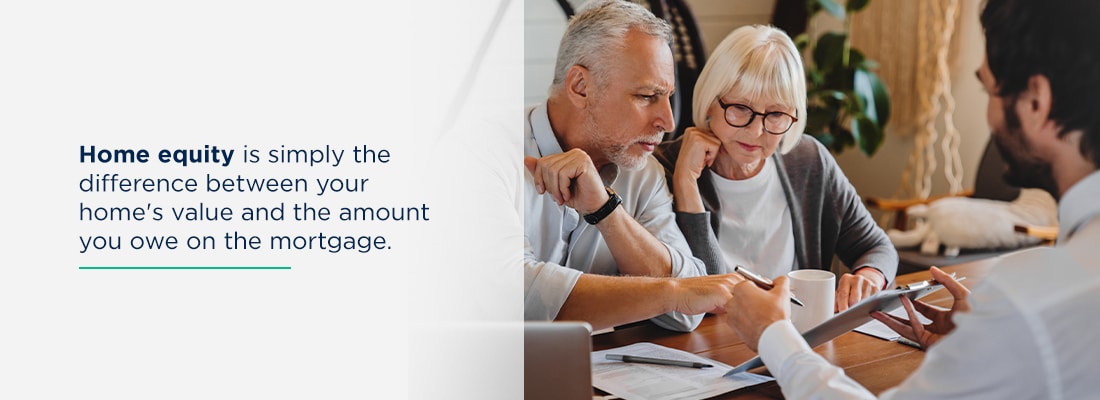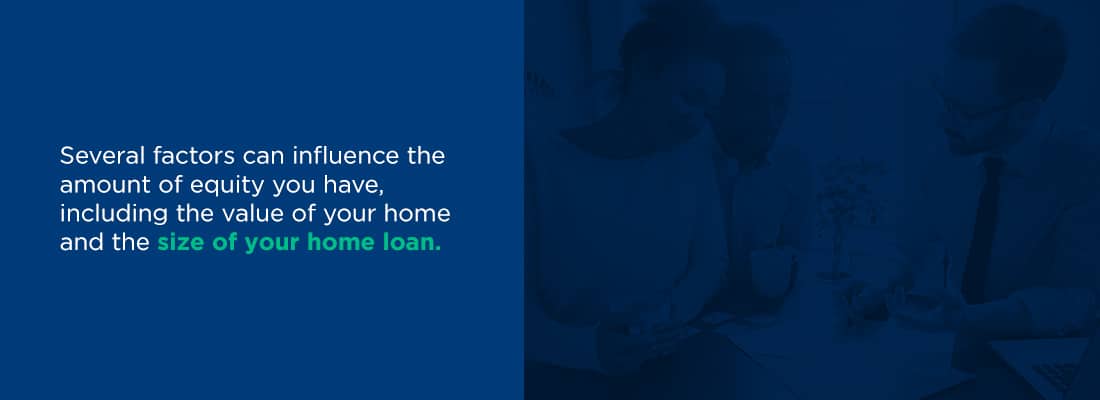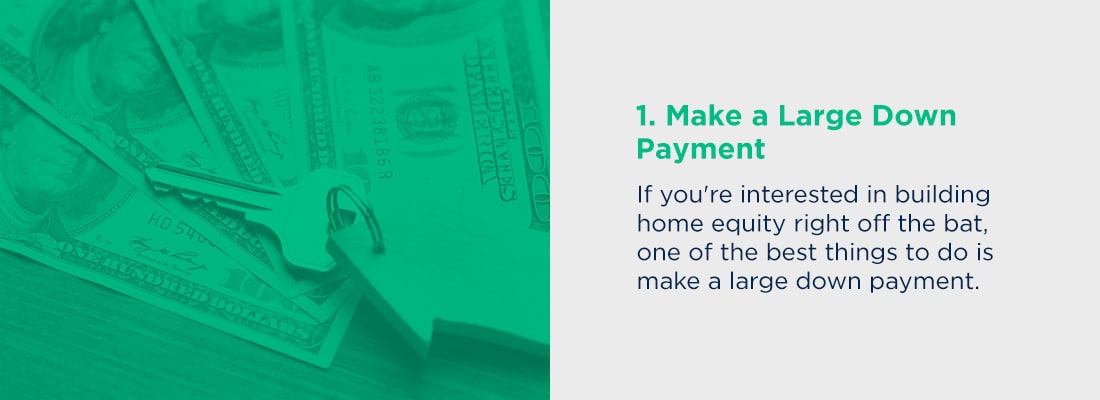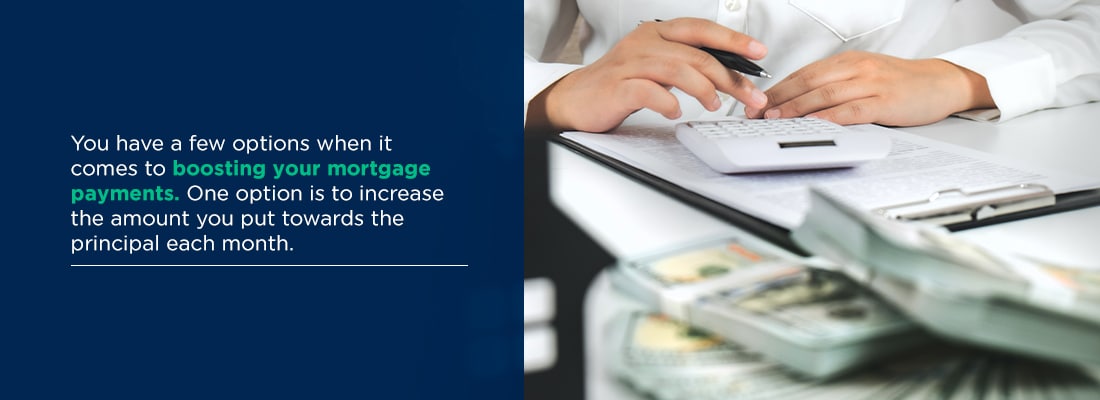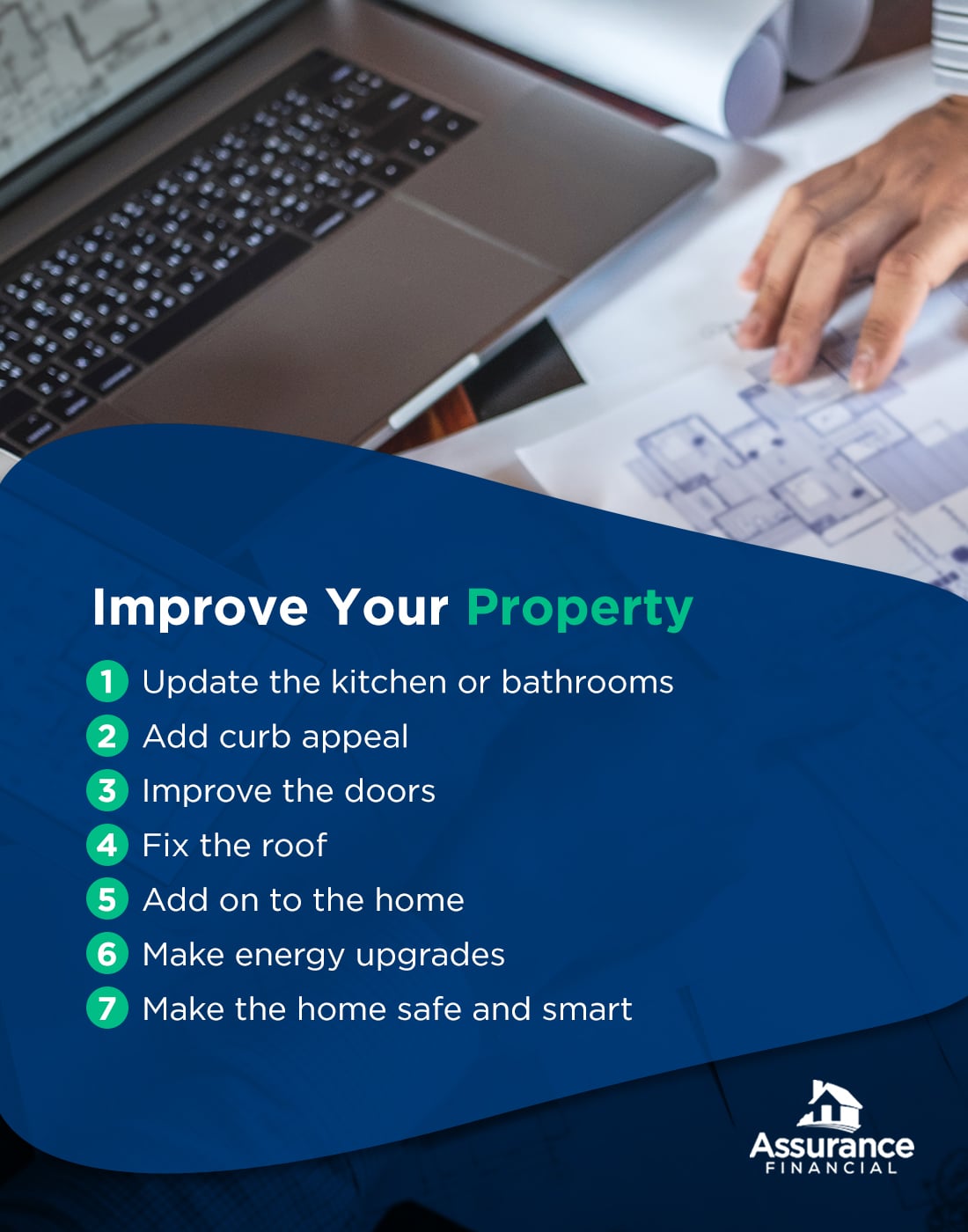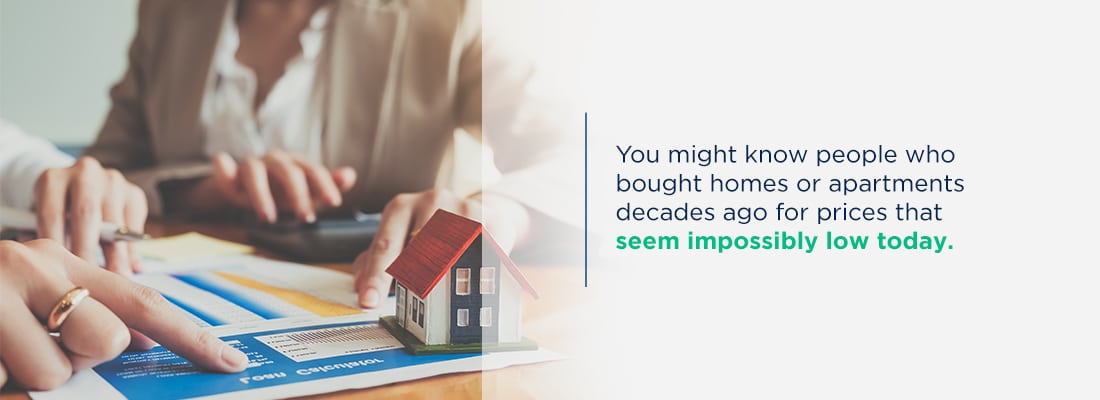When you own your home, you can feel a sense of stability and security. You have a roof over your head and a place to raise a family if you choose to do so. You also get full control over how you decorate the home and any changes you make to it.
There’s another benefit to homeownership, and that’s the chance to build equity in your home. Many homeowners look at their property as an investment. If you live in the house for long enough and make enough payments on the mortgage, at some point, your property will be worth more than you paid for it. Another way that a home acts as an investment is through equity. The more equity you have in your home, the more homeowner advantages you can enjoy. Learn more about the value of building home equity and what you can do to maximize it.
Table of Contents
- What is Equity?
- Why is Building Equity Important?
- How to Build Equity in Your Home
- Work With Assurance Financial
What Is Equity?
Home equity is simply the difference between your home’s value and the amount you owe on the mortgage. If you own your home free and clear, your equity is the same as the property’s value. Here’s a quick example of how equity works. Suppose your home’s market value is $300,000. You have a mortgage on the home and still have $220,000 left to pay on it. In this example, the equity in your home is $80,000, or $300,000 minus $220,000.
For many homeowners, equity increases the longer they own their homes. As you make payments on your mortgage, the principal on the loan decreases. Meanwhile, the share of your equity grows.
Although equity usually goes up, it can drop. For example, perhaps you bought a home worth $300,000 and took out a $250,000 mortgage to do so. At the time of closing, your equity in the home was $50,000. Then, a recession happened and the value of homes in your area dropped. Your home now has a market value of $250,000 and you have $225,000 left on your mortgage. Even though you’ve paid off some of your loan principal, since the value of the property has fallen, you now only have $25,000 in home equity.
Why Is Building Equity in a Home Important?
Building equity in your home helps you establish financial freedom and flexibility. The greater your home equity, the better you may be able to weather financial hardships that come your way. Once you establish some equity in your home, you can use the cash value of the equity when necessary. There are two ways to tap into your home’s equity.
One option is to apply for a home equity loan. Just as your mortgage uses your home as collateral, so does a home equity loan. Usually, you can borrow up to 85% of the full amount of equity you have in your home. If your equity is $50,000, your home equity loan can be up to $42,500.
You can use the funds from the loan for pretty much any purpose. Some people use the loan to cover the cost of a home improvement project, while others use the loan to help pay for their children’s college education. Typically, you repay the loan in installments, making monthly payments until you’ve repaid it in full, plus interest. The amount of interest you pay depends on the market conditions, your credit score and how much you borrow.
The other way to tap into your home’s equity is with a home equity line of credit (HELOC). A HELOC is similar to a credit card. You have a credit limit and can borrow up to that limit. Once you repay the amount you’ve borrowed, you can borrow more, provided you’re still in the draw period.
The more equity you have in your home, the bigger your financial cushion if you need to borrow against it. It’s important not to go overboard when borrowing against your home’s equity. If you have difficulty repaying your home equity loan or HELOC, you do risk losing your home, just as you would if you can’t make payments on your original mortgage.
Even if you don’t plan on borrowing against your home, equity matters. If you’re planning to sell the property in the near future, the larger your equity, the more cash you’ll walk away from the closing table with. Having a lot of equity in your current home can mean you have more to put down on your next home. It can also help you afford a more expensive house the next time you are in the market.
How to Build Equity in Your Home
The less you owe on your mortgage, the more equity you likely have in your home. Several factors can influence the amount of equity you have, including the value of your home and the size of your home loan. While you can’t take control of the market, you can do several things to help build equity in your home:
1. Make a Large Down Payment
Although there are many programs that make it possible to get a home loan without putting down a hefty down payment, if you’re interested in building home equity right off the bat, one of the best things to do is make a large down payment.
Let’s say you’re interested in purchasing a home worth $250,000 and you’re trying to decide how much to put down. If you made a down payment of 5%, or $12,500, you would have equity of $12,500 from the start. You’d also have to make private mortgage insurance payments on the loan until you’d paid off 20% of its value.
Your equity would jump to $25,000 if you made a down payment of 10%, and your monthly private mortgage insurance payments would drop. If you can afford a 20% down payment, your equity in the home would be $50,000 from the beginning. You also wouldn’t have to make any private mortgage insurance payments, and your monthly mortgage would be notably smaller than if you put down 10% or 5%.
When deciding if it’s worth it to make a big down payment or not, there are some things to consider aside from home equity. One factor is how long it will take you to save up your down payment. If home values in your area are increasing rapidly and you have enough to put down 5% or 10%, it can make sense to buy now, even though you don’t have a full 20% down payment. By the time you saved enough to put down 20% on a $250,000 home, a property once worth $250,000 might be selling for $300,000 or more in a competitive market.
Another thing to consider is how making a larger down payment will affect your savings. It’s a good idea to have extra money set aside after you buy a house to cover unexpected repairs or to make improvements. If a big down payment will drain your savings, it may be better to save some money for a rainy day, so you don’t have to borrow additional money to pay for home-related expenses.
When buying a home, the amount people put down typically depends on their status as homebuyers. First-time buyers put down a median of 6%, while repeat buyers pay a median of 16% down.
2. Make Larger Mortgage Payments
If making a big down payment upfront doesn’t work for your budget or would put homeownership years out of reach, another way to build equity relatively quickly is to boost the size of your mortgage payments. When you closed on your home, you likely got a copy of the amortization schedule, which detailed how your mortgage payments will break down over the term of your loan, provided you made the same payment each time.
When you make a bigger-than-required mortgage payment, that schedule is completely updated, as you’ll be reducing the size of your principal and speeding up the repayment process. You’ll also be building equity in your home by reducing your debt obligation. Even paying an extra $100 per month reduces your mortgage amount, improving your equity.
You have a few options when it comes to boosting your mortgage payments. One option is to increase the amount you put towards the principal each month. Many mortgage providers give you the option of paying extra towards the principal when you schedule your monthly payment. You can choose to pay an additional $100, $500 or more each month, based on your budget.
Another way to make bigger mortgage payments is to pay more often. If you pay half of your monthly mortgage payment every other week, you’ll end up making one extra monthly mortgage payment per year.
You can also decide to make a lump sum, additional payment to your mortgage when you can. For example, if you get a hefty tax refund, you might decide to apply some or all of it toward your mortgage. If you inherit money, you can put it toward your mortgage, reducing the size of your principal and boosting your home equity.
3. Improve Your Property
Bringing down your mortgage principal is one way to raise your home equity. The second option is to increase the value of your property. The good news is that there are things you can do to improve your property and its value. Here’s how to build home equity with home improvements:
- Update the kitchen or bathrooms: Kitchens and baths tend to be the rooms that really sell homes. The better and more desirable your home’s kitchen and bathrooms are, the more you can ask for when selling it and the higher the property’s value. A minor, mid-range kitchen remodel might boost the value of your home by $18,206 and allow you to recoup about 78% of the cost of the remodel.
- Add curb appeal: Improving your home’s curb appeal can increase its value by about 7%. Think of it this way, more buyers will be interested in a property that looks attractive and inviting from the outside than in a property that looks like it’s in need of some TLC. Boosting curb appeal doesn’t have to cost a lot, either. Adding a few planters, repainting the porch and door and making sure the lawn is trimmed and trash is picked up can go a long way.
- Improve the doors: Although people often focus on the aesthetics of the home when they think about value, the bones of a home matter, too. In fact, a home with good bones and practical upgrades is often worth more than a house that doesn’t have those features. Replacing older front doors and garage doors with high-quality, more efficient options is going to raise the value of your home. When choosing replacement doors, think of efficiency and how well they seal the home to keep warm or cool air from escaping. You also want to consider security to enhance people’s feelings of safety when they are on the property.
- Fix the roof: Roofs can be expensive, and buyers are drawn to a home that has a new roof compared to a property with an old one that they might have to replace themselves. How much it may cost to replace your roof can vary based on the materials, but you can typically expect the project to boost the value of your home anywhere from $16,000 to $24,000. Many homeowners recoup about 60% to 66% of the project’s cost when they sell the property.
- Add on to the home: Size matters when it comes to home value. A three or four-bedroom home is going to be worth more than a two-bedroom home. If you have space and the budget, it can make sense to add on to the property. Building an addition can also be a good option if your family size is growing and you’re not ready to sell your home and move.
- Make energy upgrades: A home that’s energy-efficient is more attractive than one that has high utility bills. Energy-efficient homes tend to be more comfortable, even in extreme weather, than non-efficient homes. People are willing to pay more for a house with Energy Star rated appliances, low utility bills and improved comfort. Some efficient upgrades you can make include improving the HVAC system or furnace, installing better windows and replacing older appliances with more efficient models.
- Make the home safe and smart:Smart home technology streamlines people’s lives and can make your home more attractive and valuable. Installing a smart thermostat, smart lights and smart door locks are just a few of the technological updates you can make to improve your home’s value. Safety is another thing to consider. Make sure the home has working smoke alarms and carbon monoxide detectors. Most states require alarms and detectors for a home to be up-to-code.
[download_section]
4. Refinance Your Home Loan
When you first bought your home, you might have taken out a 30-year mortgage. If you’re interested in building home equity more quickly, it can make sense to refinance your loan to a 15-year mortgage. There are some key differences between the two types of loans:
- Time: You’ll repay a 15-year loan in half the time it takes to pay off a 30-year loan. That means you’ll own your home outright much sooner.
- Interest:Usually, 15-year mortgages have lower interest rates than 30-year loans because lenders view them as less risky. A lower interest rate means you pay more toward your loan principal each month, which also helps you build equity more quickly.
- Payment size:You pay more toward a 15-year mortgage each month than to a 30-year loan simply because you’re paying the loan off more quickly. A bigger principal payment means equity builds more quickly.
Depending on what interest rates were like when you applied for your mortgage the first time, you might get a better rate on a 15-year loan, reducing your monthly costs. Also, if you initially had private mortgage insurance on your loan, refinancing can mean that you no longer have to pay it. If the value of your property has increased enough and you’ve paid down enough of your first mortgage, you might have equity of 20% or more in your home when it’s time to refinance.
Before you decide to refinance your mortgage, it helps to crunch the numbers to make sure that doing so will benefit you in the long run. You’ll have to pay closing costs on the loan, which means more money upfront. You also want to make sure you can afford the higher monthly payment on the loan before you can commit to it.
If you’re unsure about committing to a higher monthly payment but can afford to make bigger mortgage payments at the moment, one option is to make payments as if you had a 15-year loan rather than a 30-year loan. You’ll pay down your principal, building equity in the home, but you will also have the option of going back to your standard monthly payments if you lose a job or have a reduction in your income.
5. Let Your Property Value Rise
You might know people who bought homes or apartments decades ago for prices that seem impossibly low today. For example, someone might have bought an apartment on the Upper West Side of Manhattan for $100,000 in the 1970s. Today, that same property is likely worth millions. Although home values can dip during recessions or periods of economic instability, for the most part, they trend upward. If you buy a house today, it’s likely to have a higher value in five or 10 years. Depending on the heat of the market, your home’s value can rise sharply after just a few years.
If you don’t have immediate plans to sell and don’t need to move right away, it makes sense to stay put in your home and let the market take its course. As long as you keep paying down the mortgage and the economy keeps growing, you’re going to see your home’s equity increase.
Interested in Refinancing Your Mortgage? Work With Assurance Financial
Refinancing your home loan lets you take advantage of lower interest rates and helps you build equity sooner. Assurance Financials’ team of licensed loan officers are here to help you through the refinancing process and can help you see if it’s the right option for you. Start your application today or find a loan officer near you.
Sources:
Linked:
- https://assurancemortgage.com/what-is-a-mortgage-payment/
- https://www.consumer.ftc.gov/articles/0227-home-equity-loans-and-credit-lines
- https://www.nar.realtor/sites/default/files/documents/2020-downpayment-expectations-and-hurdles-to-homeownership-report-04-16-2020.pdf
- https://www.remodeling.hw.net/cost-vs-value/2020/
- https://magazine.realtor/daily-news/2020/01/27/how-much-does-curb-appeal-affect-home-value
- https://assurancemortgage.com/is-refinancing-a-bad-idea/
- https://assurancemortgage.com/refinance-your-home/
- https://assurancemortgage.com/apply/
- https://assurancemortgage.com/find-a-loan-officer/
Not Linked:
- https://www.nerdwallet.com/article/mortgages/6-ways-to-build-your-home-equity
- https://www.nerdwallet.com/article/mortgages/how-to-increase-home-value
- https://www.nerdwallet.com/article/mortgages/home-equity-explained-matters
- https://www.investopedia.com/articles/personal-finance/042015/comparison-30year-vs-15year-mortgage.asp
- https://www.nerdwallet.com/article/mortgages/not-just-higher-interest-rates-affecting-mortgage-refinance-possibilities
- https://firsthome.com/5-tips-for-building-equity-in-your-home/
- https://www.homelight.com/blog/what-makes-property-value-increase/
- https://www.bankrate.com/home-equity/how-to-build-equity-in-your-home/
- https://www.thebalance.com/build-equity-315654


